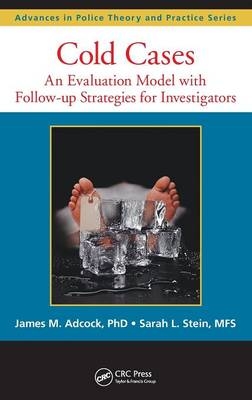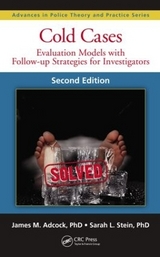
Cold Cases
Crc Press Inc (Verlag)
978-1-4398-2690-4 (ISBN)
- Titel erscheint in neuer Auflage
- Artikel merken
Nearly 185,000 homicides since 1980 remain unsolved, yet with limited staff and resources, it is no surprise that law enforcement units place the bulk of their efforts on current cases where victims’ family members and the media demand answers. Cold Cases: An Evaluation Model with Follow-up Strategies for Investigators provides a comprehensive roadmap for digging those cold cases out of the file room and getting them resolved. Practical and concise, the book is an invaluable tool for police officers and detectives attempting to solve crimes that would otherwise be forgotten.
Evaluating the Case
Divided into three sections, the book begins with a historical perspective on how cases get to the point where it appears all investigative leads have been exhausted. It includes a chapter on understanding the process of homicide and those who kill — critical information for the homicide investigator. Next, the authors explain the evaluation model. They demonstrate the key elements of organization, thoroughness, and the value of the scientific method. This section validates theories of the crime, raises evidentiary issues and concerns, addresses the informational and behavioral aspects relative to the crime and the participants in the crime, and documents investigative strategies for future efforts on the case.
Investigating and Solving the Crime
The third section discusses the investigation that follows the evaluation. The book considers questions investigators must ask, including what should be looked at beyond the case file itself, and how the growth in technology since the date of the incident might provide new opportunities to uncover clues. This section also explores the choice of interview/interrogation techniques based on the behavioral aspects involved. Finally, the authors suggest how investigators can maximize their efforts and obtain not just an arrest, but a conviction.
Useful appendices include sample standard operating procedures from three different agencies to use as a guide for setting up a cold case unit and a list of additional resources a department may look to for assistance. By following the cold cases evaluation model in this volume, those charged with resolving long-forgotten crimes can increase their chance of an accurate resolution, or at least be able to say that everything that can be done has been done.
James M. Adcock, PhD and Sarah L. Stein, MFS are with The Center for the Resolution of Unresolved Crime (CRUC) in Hattiesburg, Mississippi, USA
Section I: Getting Started: How Do We Prepare to Review and Conduct Cold Case Investigations?
What Is a Cold Case and How Did We Get Here? J. M. Adcock and S. L. Stein
Historical Perspective
Understanding the Process of Homicide and Those Who Kill; J. M. Adcock and S. L. Stein
Social Scientists’ Research on Homicide
Homicide During the 1960s to 1990s
Solvability Research
The Phases of Homicide
Creating a Cold Case Squad (Concepts for Initialization); J. M. Adcock and S. L. Stein
Section II: The Evaluation Process
The Cold Case Evaluation Model—Introduction and Phase I; J. M. Adcock and S. L. Stein
Introduction
Cold Case Evaluation Protocol
Phase I
The Case File
Official Documents
Police Reports
Victimology
Statements/Interviews
Physical/Forensic Evidence
Records
Persons of Interest
Handwritten Notes
Media
Miscellaneous
The Cold Case Evaluation Model—Phase II; J. M. Adcock and S. L. Stein
The Evaluation Model
The Cold Case Evaluation Model—Phases III and IV; J. M. Adcock and S. L. Stein
Phase III
Phase IV
Section III: Follow-up Investigative Strategies
Applying Science and Technology to Cold Cases; A. B. Harper
Science and the Scientific Method in Criminal Investigation
Scientific Advances, Databases, and Linkage Possibilities
DNA and Biological Evidence
Fingerprint Evidence
Ballistics Evidence
Other Database and Analytical Tools
Suspect Identification Using Pre-, Peri-, and Post-Offense Behaviors; R. Walter, S. L. Stein, and J. M. Adcock
Perpetrator Subtypes
Power-Assertive Type
Power-Reassurance Type
Anger-Retaliatory Type
Anger-Excitation Type
Methods
Crime Behavior
Pre-Crime Behavior
Post-Crime Behavior
Case Illustration
Interview and Interrogation Issues and Concerns Relating to Cold Cases; J. M. Adcock and S. L. Stein
The Interview Process
The Behavioral Analysis Interview (BAI)
The Prescriptive Interview
Murder Typologies and Interrogation Strategies
Evaluation Reports and Legal Considerations; J. M. Adcock and S. L. Stein
Report Formats
The Prosecutor
Legal Considerations
General Considerations
Chain of Custody
Memory of Witnesses
Loss of Evidence
Other
The Murder of Martha Moxley (A Case Study)
Martha’s Story
Conclusion; J. M. Adcock and S. L. Stein
Appendices
A: Office of the Morris County Prosecutor—Standard Operating Procedures
B: Metropolitan Police Department—Major Case/Cold Case Squads—Standard Operating Procedures
C: Establishing a Police Gray Squad to Resolve Unsolved Homicide Cases—Tulsa Police Department, Tulsa, OK
D: Sample Cold Case Evaluation Report
E: Alternate Resources for Investigators
Index
| Erscheint lt. Verlag | 19.11.2010 |
|---|---|
| Reihe/Serie | Advances in Police Theory and Practice |
| Zusatzinfo | PPI 434; 7 Tables, black and white; 33 Illustrations, black and white |
| Verlagsort | Bosa Roca |
| Sprache | englisch |
| Maße | 156 x 234 mm |
| Gewicht | 522 g |
| Themenwelt | Recht / Steuern ► Allgemeines / Lexika |
| Recht / Steuern ► EU / Internationales Recht | |
| Recht / Steuern ► Strafrecht ► Kriminologie | |
| Sozialwissenschaften ► Soziologie | |
| ISBN-10 | 1-4398-2690-0 / 1439826900 |
| ISBN-13 | 978-1-4398-2690-4 / 9781439826904 |
| Zustand | Neuware |
| Informationen gemäß Produktsicherheitsverordnung (GPSR) | |
| Haben Sie eine Frage zum Produkt? |
aus dem Bereich



